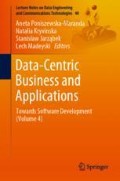Abstract
The purpose of this paper was to analyse problem of cheating in online games and to design a comprehensive tool for the Unity engine that detects and protects the applications against unauthorized interference by the user. The basic functionality of the tool is detecting and blocking unauthorized interference in the device’s memory, detecting the modification of the speed of time flow in the game and detecting time changes in the operating system. The research also examined the current potential of blockchain technology as a secure database for the game. Proposed algorithms where implemented and tested for usability and speed of operation.
Access this chapter
Tax calculation will be finalised at checkout
Purchases are for personal use only
References
Feng WC, Kaiser E, Schluessler T (2008). Stealth measurements for cheat detection in on-line games. In: Proceedings of the 7th ACM SIGCOMM workshop on network and system support for games. ACM, pp 15–20
Heo GI, Heo CI, Kim HK (2015) A study on mobile game security threats by analyzing malicious behavior of auto program of clash of clans. J Korea Inst Inf Secur Cryptol 25(6):1361–1376
Bremer J (2013) Automated analysis and deobfuscation of android apps & malware. Freelance Security Researcher
Consalvo M (2007) Cheating: gaining advantage in videogames. Massachusetts Institute of Technology, pp 5–8
McGraw G, Hoglund G (2007) Online games and security. In: IEEE Security & Privacy, vol 5, no 5, pp 76–79
Joshi R Cheating and virtual crimes in massively multiplayer online games. Royal University of London
Tolbaru SA (2011) Cheating in online video games, University of Copenhagen, Datalogisk Institut, 15 Aug 2011
Yeung SF, Lui JCS, Liu J, Yan J (2006) Detecting cheaters for multiplayer games: theory, design and implementation 1178–1182
Yan J, Randell B (2005) A systematic classification of cheating in online games. In: Proceedings of 4th ACM SIGCOMM workshop on Network and system support for games. ACM
Park JK, Han ML, Kim HK (2015) A study of cheater detection in FPS game by using user log analysis. J Korea Game Soc 15(3):177–188
Ahn D, Yoo B (2017). A study of cheating identification and measurement of the effect in online game
Raymond E (1999) The case of the quake cheats, Unpublished manuscript
Baughman N, Levine B (2001) Cheat-proof playout for centralized and distributed online games. In: Proceedings of the twentieth IEEE INFOCOM conference
Li K, Ding S, McCreary D (2004) Analysis of state exposure control to prevent cheating in online games. In: The 14th ACM international workshop on network and operating systems support for digital audio and video (NOSSDAV)
Cano N (2016) Game hacking: developing autonomous bots for online games. No Starch Press
Olleros FX, Zhegu M (2016) Research handbook on digital transformations, Edward Elgar Publishing
Swan M (2015) Blockchain: Blueprint for a new economy, O’Reilly Media
Zyskind G, Nathan O (2015) Decentralizing privacy: using blockchain to protect personal data. In: Security and privacy workshops (SPW), 2015. IEEE, pp 180–184
McDonald J (Valve), Using deep learning to combat cheating in CSGO
Author information
Authors and Affiliations
Corresponding author
Editor information
Editors and Affiliations
Rights and permissions
Copyright information
© 2020 Springer Nature Switzerland AG
About this chapter
Cite this chapter
Kedziora, M., Gorka, A., Marianski, A., Jozwiak, I. (2020). Anti-Cheat Tool for Detecting Unauthorized User Interference in the Unity Engine Using Blockchain. In: Poniszewska-Marańda, A., Kryvinska, N., Jarząbek, S., Madeyski, L. (eds) Data-Centric Business and Applications. Lecture Notes on Data Engineering and Communications Technologies, vol 40. Springer, Cham. https://doi.org/10.1007/978-3-030-34706-2_10
Download citation
DOI: https://doi.org/10.1007/978-3-030-34706-2_10
Published:
Publisher Name: Springer, Cham
Print ISBN: 978-3-030-34705-5
Online ISBN: 978-3-030-34706-2
eBook Packages: Intelligent Technologies and RoboticsIntelligent Technologies and Robotics (R0)

